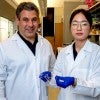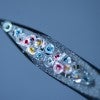
Fish thought to help reefs have poop that’s deadly to corals
Rice bioscientists have discovered the feces of fish that were long thought to promote healthy reefs can damage and, in some cases, kill corals.

Fish thought to help reefs have poop that’s deadly to corals
Rice bioscientists have discovered the feces of fish that were long thought to promote healthy reefs can damage and, in some cases, kill corals.

Rice to hold 110th commencement May 5-6
Rice University’s 110th commencement ceremonies will be held May 5 and 6, concluding with the undergraduate ceremony at Rice Stadium the night of May 6 featuring an address from Karine Jean-Pierre, White House press secretary and assistant to the president.

Study unlocks potential breakthrough in Type 1 diabetes treatment
Rice University scientists identified three biomaterial formulations that could help develop a more sustainable, long-term, self-regulating way to treat Type 1 diabetes using a new screening technique that involves tagging each biomaterial formulation in a library of hundreds with a unique “barcode.”

Mariachi Luna Llena performs 9th annual Mariachi Spectacular concert
Mariachi Luna Llena performed its ninth annual Mariachi Spectacular concert at Hudspeth Auditorium April 21-22.

Faculty, staff, students honored for excellence in teaching, mentoring, service
Each year, Rice honors members of the university community who have served students through outstanding teaching, dedication and service. Here are recipients of some of this year's awards.

Rice graduate programs land among nation’s best in US News rankings
Numerous Rice University graduate programs ranked in the nation’s top 25 in their respective categories in the latest edition of U.S. News and World Report’s “Best Graduate Schools” rankings.

Jeans-sizing software company wins 2023 NRLC championship
Goldie took home the top prize with its fit-finding software for women’s jeans at the April 19 H. Albert Napier Rice Launch Challenge (NRLC) championship. The NRLC is Rice’s new venture competition, where its undergraduate, graduate and MBA students can pitch their businesses to win a share of $100,000 in equity-free funding.

32 Rice students, alums win NSF Graduate Research Fellowships
The National Science Foundation has awarded Graduate Research Fellowships to 32 current, incoming and former Rice students, and selected another six for honorable mention.

Rice Chabad hosts its biggest ‘Mega Shabbat’ dinner yet
Chabad at Rice welcomed over 100 students and other members of the Rice community to its annual “Mega Shabbat” dinner for an evening of traditional Jewish food, fun and fellowship March 24.

Speaking Spanish on the campaign trail may seem like a good way to connect with some voters, but new research from Rice University finds it can actually hurt the chances of Hispanic candidates who aren’t native speakers.

Ocean warming intensifies viral outbreaks within corals
A groundbreaking three-year study has found evidence that ocean warming can trigger outbreaks of viruses that attack the symbiotic algae inside corals.

A 21st-century remedy for missed meds
Rice lab’s next-level encapsulation technology for drugs and vaccines could solve a $100 billion problem.

Landscape architect to host informational event on Academic Quad redesign
As part of the next phase of the redesign of Rice’s Academic Quadrangle, President Reginald DesRoches and Nelson Byrd Woltz (NBW), the landscape architect design team leading the project, are inviting students to attend an informational event in the quad March 9 from 4 to 6 p.m.

Rice graduate studies office throws ‘Night at the Museum’ bash
Rice’s Office of Graduate and Postdoctoral Studies hosted its annual “A Night at the Museum” graduate student recruitment event Feb. 25 at the Houston Museum of Natural Science’s Morian Hall of Paleontology, a fun-filled evening amid the museum’s spectacular collection of dinosaur skeletons and other paleontological wonders.

Learning Black history in Houston’s Fourth Ward
As part of Rice’s Black History Month programming sponsored by the Office of Multicultural Affairs, students and members of the Rice community visited the Rutherford B.H. Yates Museum in Freedmen’s Town Feb. 17.